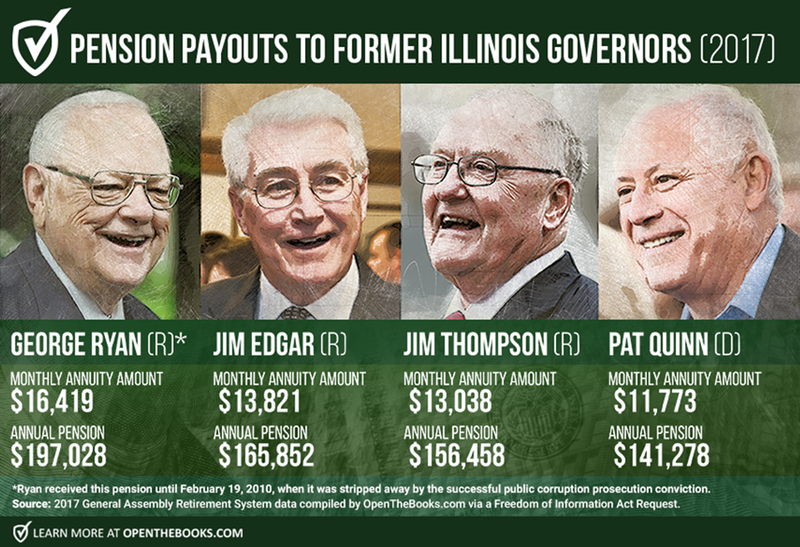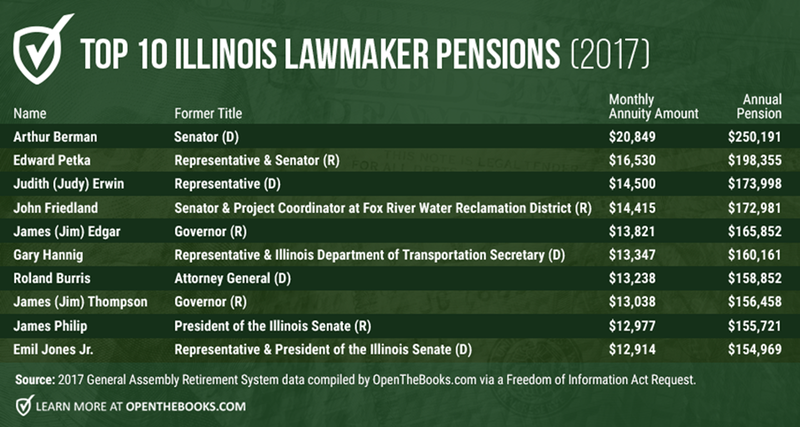Nobody knows how to game the system for personal gain like an Illinois lawmaker. The political class voted themselves tens of millions of dollars in lifetime pension payouts. It’s time to end their ‘pension palace.’
Consider just one gross example. Have you ever heard of retired back-bench state senator John Friedland?
Millions of dollars in pension payouts flowed to John Friedland since 1992. Friedland earned $35,661 as a state senator, plus another $46,500 as a part-time employee at the Fox River Water Reclamation District. When he retired from the General Assembly, he received a one month full-time pay spike at the water district for $8,000 – causing his legislative pension to start at $80,856 instead of $30,312. Today, Friedland is pulling down $172,981 per year, due to lucrative ‘cost of living’ adjustments.
Although the ‘Friedland loophole’ was closed, Illinois state legislators still have one of the sweetest retirement deals in the country – and it’s at an amazing cost to taxpayers.

Public Pension Payouts to Former Illinois Governors in 2017.
According to General Assembly Retirement System (GARS) disclosures, 137 lawmakers chose to participate in the state pension system while the rest have thankfully opted out. To fund these future retirement annuities, the state government made a $21.7 million payment in 2017, meaning each participating lawmaker’s future pension cost taxpayers $158,547 last year.
See the top all-time GARS pensions here.
At OpenTheBooks.com, we checked out who’s receiving what, when, and after how long – and it’s not pretty. For example, the largest pension of all-time goes to a 31-year long-forgotten state senator. After retiring from Springfield in 2000 – with a pension spiking stop at the Chicago schools – Arthur Berman (D) receives $20,849 every month. Annually, Berman receives $250,191 – that’s four times more than he ever made as a Springfield lawmaker.

Top 10 All-Time Illinois Lawmaker Pensions in 2017.
Current Illinois Governor Bruce Rauner (R) opted out of the Illinois pension system and refused a state salary, saving taxpayers millions of dollars. Rauner’s challenger for governor, Hyatt family fortune billionaire J.B. Pritzker, recently defended generous state pension payouts, but hasn’t commented on whether he’d take a salary and pension if elected.
Historically, former Illinois governors took the benefits and ran (sometimes to jail, of course). Consider these examples:
- In 2014, former Governor Pat Quinn (D) lost re-election and immediately started collecting a hefty pension. Today, Quinn receives $141,277 annually ($11,773 per month). Quinn was also a previous treasurer and a lieutenant governor.
- Former Governor Jim Edgar (R) costs taxpayers more than $311,000 per year. He’s double dipping the pension system for two payouts ($166,000 from GARS and $83,000 from the State University Retirement System) plus a ‘part-time’ salary for $62,796 from the University of Illinois.
- Former Governor James Thompson (R) makes $156,458 in annual pension payouts ($13,038 per month). Thompson served the longest term in Illinois governor history, then joined Winston & Strawn, a prestigious law firm in Chicago. In 2015, he announced his retirement from the firm, but agreed to continue consulting for two more years.
- In 2010, former Governor George Ryan (R) had a $197,028 annual pension ($16,419 per month), but it was stripped away by the successful public corruption prosecution conviction.
It’s not just the powerful governors who move into the pension palace when they retire. Here are just some of the Illinois lawmaker ‘big dogs’ from both parties:
- Former State Treasurer Dan Rutherford (R) lost in the republican primary for governor in 2014, but now he receives $140,692 annually ($11,724 per month) in pension payouts – that’s more than his previous treasurer salary. Rutherford was also a state representative and senator since 1993.
- Retired Chicago Mayor Richard M. Daley (D) is double dipping the pension system for nearly $222,000 per year. Daley makes $140,455 a year in state lawmaker pension payouts after a short eight-year career as a state senator and another $81,355 a year in city pension payouts for his 22 years as the mayor of Chicago.
- Former Speaker of the House Denny Hastert (R) cashed in for a $28,020 legislative state pension in 2015 before heading off to his congressional career. However, the GARS board yanked his pension in 2017 after Hastert pleaded guilty to federal bank violations and sexual misconduct against underage boys decades ago as a high school wrestling coach.
- Retired State Representative Gary Hannig (D) served from 1978 through 2009. In the same year, Hannig took the top job at Illinois Department of Transportation paying $150,228 per year. He stayed only 27 months, just enough time to pump his pension to $150,960 annually. Then-Governor Pat Quinn rehired Hannig at nearly $150,000 in a new position – as his Director of Legislative Affairs. All told, Hannig was making $300,000. Not bad for a ‘public servant.’ We reached out to Hannig for comment and received no response.
- Former House Minority Leader Tom Cross (R) lost the race for state treasurer and immediately filed for his $81,016 annual pension ($6,571 per month). Cross was a state representative since 1993. Unlike other retired lawmakers, however, Cross is spending his retirement serving as the chairman of the Illinois Board of Higher Education – a volunteer position with no pay and no pension spiking tricks.
The lure of a shiny pension is so strong that some lawmakers bail on their legislative seat in Springfield, opting for their golden parachute instead. Consider these newly retired lawmakers who already moved into the pension palace:
- Former State Representative David Leitch (R) called it “bittersweet” when he decided not to seek re-election in 2016 after 30 years in office. But his $89,714 annual pension payout ($7,476 per month) is super sweet.
- Retired State Representative Monique Davis (D) resigned from office in January 2017 after a nearly 30-year career and immediately started receiving $7,363 every month in retirement annuities. In her first year of retirement, Davis pulled down $88,363 in pension payouts.
- Former Senate Republican Leader Christine Radogno resigned from office in July 2017 after expressing frustration on the partisan stalemate over the state’s finances. Immediately, Radogno began pulling down $6,751 in monthly pension payouts ($81,016 annually).
Widely reported in 2011, former State Treasurer and State Representative Dawn Clark-Netsch (D) paid back $10,000 from her pension to the state. She thought the benefits were too lucrative and inappropriate. We asked Leitch and Davis whether they planned to pay back any portion of their pension, but neither responded.
Of course, this sort of remorse is entirely uncommon. For example, former State Representative Judy Erwin (D-Chicago) spent ten years in the house and then spiked her pension with an appointment to the Board of Higher Education with a $191,000 salary. Edwin’s pension is now the third largest in the system: $14,500 per month and $173,997 per year.
Governor Rauner and 51 other legislators – first led by State Representative Dave Luechtefeld (R) in 1995 – refused to participate in the lawmaker pension plan. That’s nearly one third of the Illinois General Assembly – from both parties.
While these declinations will save taxpayers tens of millions of dollars, future payouts will still be pricey. Currently, GARS is only 14.4 percent funded. So despite hundreds of millions of taxpayer dollars already poured into the system for a very small number of participants, it’s still not enough to satisfy lawmaker greed.
In Illinois, the pension palace is one part of the housing bubble that never burst. But when it does, everyone in the state but the beneficiaries will pay.
Adam Andrzejewski (say: Angie-eff-ski) is the CEO and Founder of OpenTheBooks.com. Learn more: our comprehensive coverage of the 63,000 Illinois public officials earning more than $100,000 in FY2016 published at Forbes, click here.
(Update: Dave Luechtefeld deserves credit for being the first lawmaker to refuse a pension; however, he receives a $67,896 annual pension from the Teacher's Retirement System. So, the first non-public employee to refuse a lawmaker pension was State Representative Tom Morrison in 2010.)